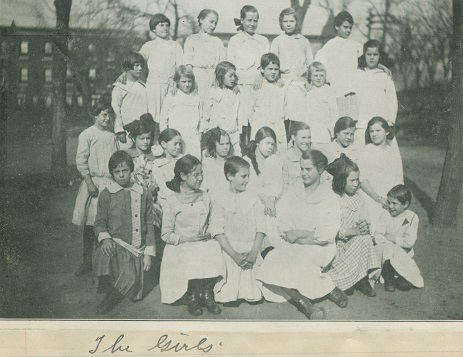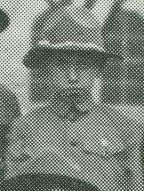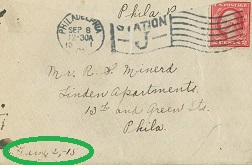
|
Keep Sweet! |
|
A Memoir by the Late Dr. Roy Sheppard Minerd - Part 3 of 12 |
Last
month: Roy
S. Minerd befriends Bill E., one of four brothers in the orphanage, who came "from
a home of squalor and want." Together, they go
on a tour
of the Philadelphia slums to show how poorly the housing compares with "the
large beautiful buildings and grounds of the Home." Roy also begins a
series of Sunday evening Bible classes and starts to inspire the boys with his
messages.
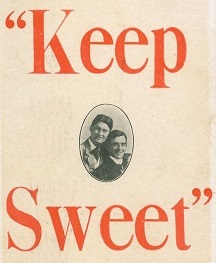
song publishers Grant Colfax Tullar
and I.H. Meredith
To go back several months -- four boys who had been attending Sunday School in Mr. H.'s class asked me if I would not see if they could not be the nucleus of a new class of which they wanted me to be teacher. Their main reason was this. All the months they had been attending, the teacher (?) was too busy talking races, prize fights, etc. to notice (if indeed he ever looked at the roll) that their names were not on the roll and never had been. The boys noticed it and felt, as one said, that they were not wanted. I spoke about it at the S.S. board meeting and it was so arranged.
One of these boys had my bible one day while I was at the piano and when I went home I found a very pretty little forget-me-not card on the back of which was printed the 121st Psalm and across the corner he had written his name and mine with the date.
Four months later he took chicken pox and was a very sick boy. While he was worst and still in isolation, his father died. He was too sick to bear the news and being still in quarantine, it would have been impossible for him to have gone to the funeral had he been well enough, so he wasn't told till Sunday following. No brothers or sisters, no parents, and no one at all except an aunt and two grandparents somewhere in Jersey -- the poor boy was heart broken and would not be comforted. I understand that his father was not much of a father, but to himthe man was father and he felt being left practically alone. For almost a week he would slip off and someone later would find him sitting alone crying in his loneliness. I didn't hear of it till too late to speak to him that Sunday, so wrote him a letter after I got home. I thought of the card he had so cleverly slipped into my bible and looking at it I found the psalm: "I will life up mine eyes to the hills from whence cometh my help," etc, just what he needed. I enclosed it with a request for its return and told him to ask Mrs. B. to read and explain it to him. He seemed to get a lot of comfort from it. Before that he was a little distant; since, he has declared himself my "body guard" and stays right at my side.
On the evening of Palm Sunday, I gave, briefly, the leading events of each day of Passion Week, with especial stress on the arrest, trial and crucifixion of Christ, asking the boys to pause a minute on the stroke of three on Friday wherever they were and, with me, offer a prayer of thanksgiving for what Christ had been willing to sacrifice for them, and ask for strength and help. I did not exact a promise -- merely requested it. Later in the week, Mrs. B. mentioned it to them again. Friday all the older boys were helping build a walk. From time to time, after lunch, one or another would go inside to see how nearly three o'clock (the "ninth hour") it was. At three they, every one, dropped their tools, broke up into little groups and were silent and thoughtful for the requested period, most of them, if not all, offering up a silent prayer for help.
|
|
|
Some of the orphan girls at the Home |
The smaller boys were not working, and one of them, who is a member of my class, was responsible for a really touching incident in connection with the hour. He is not able to tell time or to read much, and when at ten minutes past four Mrs. B. went thru the play room, there sat Eddy O. above looking at the clock. Turning as she came in, he said: "Mrs. B., is it three o'clock yet?" All that time he had been waiting and wondering if the time had come! Who can tell the thoughts that passed thru his boy mind during those minutes?
Shortly before Easter the Scouts were organized and thru Mrs. W., Mr. C., a district scoutmaster, became interested in the boys and the Home in general. On Easter morning he was present at Chapel and gave a brief talk after which he gave each of the nursery children an Easter toy.
Shortly after this, a special evening of music was given at the church, part of which was furnished by the Wesleyan College Glee Club. A place was reserved in the balcony for us and we took over about 25 boys. How they did enjoy it, especially the splendid work of Prof. M. at the magnificent organ. Usually a crowd of boys forget themselves and a little confusion or disorder often results. Not so here. The Home children all are known for their politeness and good behavior.
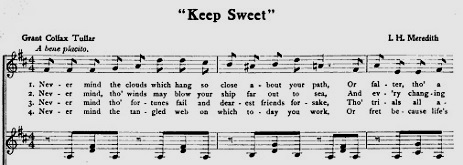 |
| Keep Sweet! sheet music - courtesy Google Books |
In the Spring, the playground was fixed up, I think, by the City. At least, they helped. Swings, travelling rings, sliding board, teeters, etc. were put up in the yard for the first time. And none of them have grown old to the boys and girls. Someone is enjoying them every minute of the play hours.
After school closed an there were no lessons to take up the evenings, I went up often in the early summer and saw their little garden patches, most of which were about a yard square -- and I had to see and comment on every last one of them -- talked to them about Nature work, elementary botany, seeds, germination, leaves, arrangement, etc., etc., and had very enjoyable times. Many of them became intensely interested in the work and soon we were studying the trees on the grounds. Many of the boys can name every tree on the place.
|
|
|
Charles Valco |
About this time three boys, then ill-nourished starved chaps, the oldest of whom is about 10, were admitted to the Home. Their father is dead, and their overworked mother was taken to the hospital, thought to be in a dying condition. The following Sunday the oldest came with the others to my class at Sunday School. He was so bright and attentive, eager and anxious to get every word that my attention was drawn to him. When he went back to the Home after the session Miss S. met him in the hall.
"Did you have a good time?" she asked.
"O yes indeed," was his quick reply, "I had a very nice time. And Miss S. I've had such a good time ever since I came here. I never had such a good time in all my life before."
How much of want and suffering and privation rang out in those few words and were revealed by the thin, pinched, wistful face! And what a blessing such an institution is to such children!
Early in June the Sunday School picnic was held at Burholme Park. About 35 boys and 20 odd girls with there caretakers were there with the crowd. The morning was showery after we got there, till noon, when it cleared up and the afternoon was ideal. The greater part of the afternoon I spent with a number of the boys who were especially interested in the study of the leaves and trees. We had a leaf book and identified a large number of leaves. One of those most interested was O.S. who was one of the two boys whom I failed to reach the first evening I was with them. When we got home, he had picked up more about alternate, whorled, opposite and ranked arrangement and palmate and primate net and parallel venation, etc., than many older than he absorb in a whole course of Botany in school.
| 'About this time I taught them a song of Tullar Meridith's -- "Keep Sweet," and it sort of stormed the castle. The chorus was on the lips of everyone and "Keep Sweet!" was heard from every corner if someone got out of humor.' |
The other of the two boys I asked to aid in getting my material and apparatus ready for the two experiments I have mentioned above, and won him thru that now he is a staunch friend.
No accident marred the day, and the only thing regrettable was the sickness of two of the boys. Chas. V. ["Valco," seen here] got car sick on the way out and Willie B. became very sick later in the day. An abscess on his heel, from an infected blister, had been neglected and set up a toxic condition throughout the body. His temperature and pulse were very high, and he couldn't get his shoe on for the swelling. Dr. L., the superintendent, took him home in his car and he recovered in a few days.
The neglect had been on his part. He had failed to report to the nurse for treatment as he should, but he was scarcely to be criticized for that, for the nurse instead of being gentle and sympathetic and helpful, was exactly the opposite and treated the boys in such a way that, rather than "beard the lion(ess) in her den," they endured their aches and sufferings in silence, not even reporting such inhuman actions to their caretakers or the superintendent for such time. However, "murder will out," and she was dismissed.
About this time I taught them a song of Tullar Meridiths's -- "Keep Sweet," and it sort of stormed the castle. The chorus was on the lips of everyone and "Keep Sweet!" was heard from every corner if someone got out of humor. [Editor's note -- This song was developed through the Christian Endeavor organization, and Tullar Meridith Company was a successful New York City publisher of Methodist and evangelistic music at the time.]
|
Keep Sweet! Never mind the clouds which hang so close about your path CHORUS:
"Keep Sweet, "Keep Sweet," Never mind, tho' winds may blow your shop far out to sea, Never mind tho' fortunes fail and dearest friendfs forsake, Never mind the tangled web on which today you work, |
|
Copyright © 1907 Tullar-Meredith Co. |
|
|
|
One of the boys' letters, with "2 Tim 2,-15" |
Sometime in May one of the boys asked me if I'd remove some warts from his hands. I went at them with the knife and silver stick, First day there were 38 warts -- not all his -- and the next week there were 63. Most of them left after the second treatment, and very few required more than the third. New boys came from time to time, and they had warts -- one had a very small hand with only 18 on the right and 10 on the left hand. The largest number treated and removed in one day was 87!
On June 6th I went to my home near Pittsburgh for two weeks, being absent from the boys two Sunday evenings. But I sent a letter to be read at the regular Sunday evening hour, and received replies from quite a number of the chaps.
In one of my letters, I told them to memorize 2 Timothy 2:15, and I would tell two stories about the verse when I returned, at least one of which was true. My first Sunday evening after returning I could not spend with them, the Home being quarantined on account of a case of scarlet fever having developed among the girls, but the next meeting night I told the stories and mentioned in one of them, the use of "2 Tim. 2:15" on the envelope or card in correspondence.
Also the signal to recall it -- two fingers up and the reply, three fingers up, immediately releasing the thumb and little finger, making 3 and 5 the product of which is 15, the last of the reference. They took to it at once and part of their "good night" was "two fingers up." Several letters since -- in fact all I have gotten since then -- have had "2 Tim 2:15" written across the envelope somewhere.

Next month: More of the boys begin to realize that their unhappiness is due to their own poor attitudes. Roy spends time with some of the more difficult boys, and leads them deeper into the teachings of the Bible. Soon, several of them agree to commit their lives to Christ.
Copyright © 2001 Mark A. Miner
